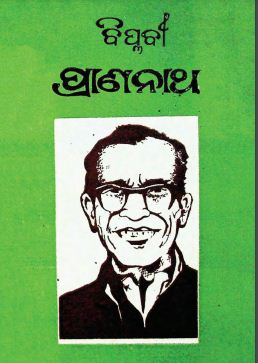Published in 1991, “Biplabi Prananath” offers a captivating glimpse into the life of Prananath Patnaik, a notable figure of the Indian freedom movement. Written by Upendra Prasad Naik, this biography delves into the adolescent years of Prananath, illustrating how his youthful spirit and fervent nationalist ideas shaped his journey in the quest for independence. Through rich storytelling and meticulous research, Naik brings to light the passion and determination of a young revolutionary who played a pivotal role in the struggle against British colonial rule.
“Biplabi Prananath” is essentially a sub-biography, focusing on Prananath’s early life and his transformation into a freedom fighter. Born in a time of colonial oppression, Prananath’s adolescence was marked by the fervor of independence movements that swept across India. The book vividly portrays his formative years, describing the socio-political climate that ignited his revolutionary spirit.
Naik’s portrayal of Prananath captures his youthful idealism and the influences that shaped his convictions. From a young age, Prananath was inspired by national leaders and their calls for resistance against colonial powers. This biography emphasizes his transition from an impressionable youth to a determined activist, showcasing the events that catalyzed his involvement in the freedom struggle.
Naik does an excellent job of embedding Prananath’s personal story within the broader context of India’s freedom movement. “Biplabi Prananath” recounts key historical events and movements, such as the Quit India Movement, linking them to Prananath’s developing political consciousness. The narrative illustrates how the socio-political unrest of the time fueled his desire to participate actively in the fight against British rule.
The book highlights various forms of resistance Prananath engaged in, showcasing his courage and resilience amidst public unrest. Through vivid accounts of protests, arrests, and sacrifices, Naik captures the essence of a collective struggle for independence. This connection between Prananath’s individual journey and the larger freedom movement serves to inspire readers, illustrating the impact of youthful enthusiasm in bringing about change.
One of the most compelling aspects of “Biplabi Prananath” is its exploration of adolescent aspirations. Naik provides a nuanced view of Prananath’s dreams, challenges, and the ideals that drove him. He portrays the struggles of young revolutionaries who often faced societal and familial pressures, yet chose to prioritize their commitment to their country.
The biography also sheds light on Prananath’s innovative ideas, highlighting his intellectual engagement with the principles of freedom, equality, and justice. As a young thinker, he contributed to discussions around nationalism, advocating for unity among diverse communities. Naik underscores that the thoughts and ideals of young leaders, like Prananath, played a significant role in shaping the movement for independence.
“Biplabi Prananath” is not just a biography but a testament to the power of youthful idealism and courage. Upendra Prasad Naik successfully brings to life the story of a young revolutionary whose determination and zeal significantly influenced the freedom movement. Through meticulous research and engaging storytelling, Naik reminds readers of the invaluable contributions of youth in the fight for justice and equality.
This biography serves as an inspiration, particularly to younger generations, encouraging them to embrace their passions and fight for their beliefs. “Biplabi Prananath” is a poignant reminder that change often begins with the dreams of the youth, making it a must-read for anyone interested in history, politics, and the indomitable spirit of the human heart.
Books Info
| Books name | Biplabi Prananath/ବିପ୍ଲବୀ ପ୍ରାଣନାଥ |
| Editor | Upendra Prasad Naik |
| No Of pages | 227 |
| Publisher | Chitrakala Prakashani |
| Publication | 2020 |
| Printed At | Ekamra Press |
| Distributor | NA |

